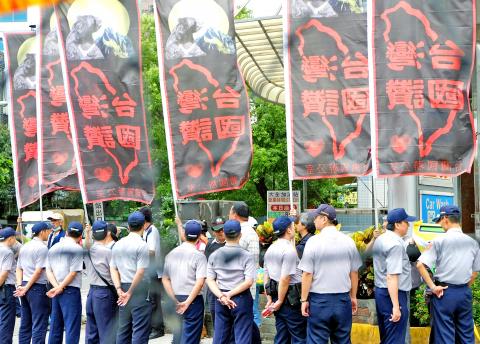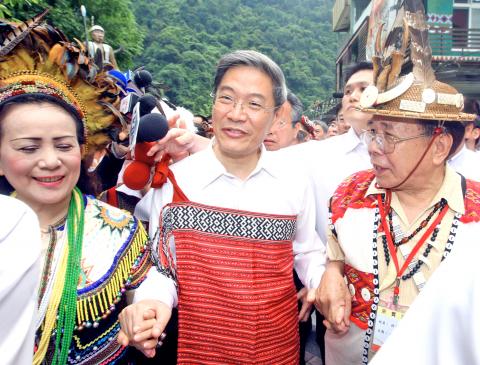The media were shut out of yesterday’s meeting between China’s Taiwan Affairs Office (TAO) Minister Zhang Zhijun (張志軍) and New Taipei City Mayor Eric Chu (朱立倫), which had been scheduled to be held before cameras.
Instead, Zhang and Chu met for 40 minutes behind closed doors.
A city official, who was not authorized to speak for the city government, told the Taipei Times that the TAO demanded that the Zhang-Chu talk be held away from cameras to prevent a possible reccurrence of what it called the “[Greater Tainan Mayor] William Lai (賴清德) incident in Shanghai,” referring to Lai’s statement during a visit to Shanghai that the future of Taiwan is a matter to be determined by its 23 million people.

Photo: Sam Yet, AFP
Zhang made a few short remarks after the meeting without taking questions from reporters, as he has done since arriving on Wednesday.
He praised the facilities in Tucheng (土城) and Sijhih (汐止) districts that provide care services for elderly people and children that he visited earlier in the day.
Both sides of the Taiwan Strait should promote exchanges in the fields of care services for the elderly and children, Zhang said, adding that the focus of future cross-strait economic cooperation should be extended to small and medium-sized (SMEs) enterprises without overlooking the needs of big businesses.

Photo: CNA
Zhang later visiting the Vigor Kobo bakery, where he sat down with several SME leaders, along with Mainland Affairs Council Deputy Minister Chang Hsien-yao (張顯耀) and Economic Development Director Yeh Hui-ching (葉惠青).
“I am here to listen to what SMEs [businesspeople] have to say, your ideas and suggestions, hoping that this would be helpful to promote cross-strait economic and trade exchanges and to benefit SME,” Zhang told the business leaders.
Zhang said the potential for SMEs on both sides of the strait was “unlimited,” as long as both sides take the right path of cooperation.
The discussions focused on difficulties that SME entrepreneurs said they have encountered when investing in China.
Zhang then headed to Wulai (烏來), where he met Aboriginal representatives and promised some elderly Atayals that China would do more to promote Aboriginal villages in Taiwan as tourism destinations for Chinese tourists.
Zhang’s engagements with elderly people, children, SMEs leaders and some Atayals were open to a small number of “lucky” journalists.
On several occasions, reporters squabbled with council officials and police officers they said were impeding them from doing their job.
At the nursing center in Tucheng, the council and the city government initially insisted that only six of the 26 reporters who arrived on a bus provided by the council for the media covering Zhang’s visit would be allowed inside the center when Zhang and the mayor chatted with residents over lunch.
The officials only backed off after the repeated arguments with reporters.
Zhang also held a closed-door discussion last night with about 11 academics, mostly well-known unification activists, including New Revolutionary Alliance (新同盟會) president Hsu Li-nong (許歷農), a retired general, and Shih Hsin University professor Wang Hsiao-po (王曉波).

The Ministry of the Interior (MOI) is to tighten rules for candidates running for public office, requiring them to declare that they do not hold a Chinese household registration or passport, and that they possess no other foreign citizenship. The requirement was set out in a draft amendment to the Enforcement Rules of the Public Officials Election and Recall Act (公職人員選舉罷免法 ) released by the ministry on Thursday. Under the proposal, candidates would need to make the declaration when submitting their registration forms, which would be published in the official election bulletin. The move follows the removal of several elected officials who were

The Republic of China (ROC) is celebrating its 114th Double Ten National Day today, featuring military parades and a variety of performances and speeches in front of the Presidential Office in Taipei. The Taiwan Taiko Association opened the celebrations with a 100-drummer performance, including young percussionists. As per tradition, an air force Mirage 2000 fighter jet flew over the Presidential Office as a part of the performance. The Honor Guards of the ROC and its marching band also heralded in a military parade. Students from Taichung's Shin Min High School then followed with a colorful performance using floral imagery to represent Taiwan's alternate name

FOUR DESIGNATED AREAS: Notices were issued for live-fire exercises in waters south and northwest of Penghu, northeast of Keelung and west of Kaohsiung, they said The military is planning three major annual exercises across the army, navy and air force this month, with the navy’s “Hai Chiang” (海強, “Sea Strong”) drills running from today through Thursday, the Ministry of National Defense said yesterday. The Hai Chiang exercise, which is to take place in waters surrounding Taiwan, would feature P-3C Orion maritime patrol aircraft and S-70C anti-submarine helicopters, the ministry said, adding that the drills aim to bolster the nation’s offshore defensive capabilities. China has intensified military and psychological pressure against Taiwan, repeatedly sending warplanes and vessels into areas near the nation’s air defense identification zone and across

COVETED PRIZE: The US president would be a peace prize laureate should he persuade Xi Jinping to abandon military aggression against Taiwan, William Lai said US President Donald Trump should get the Nobel Peace Prize should he be able to convince Chinese President Xi Jinping (習近平) to abandon the use of force against Taiwan, President William Lai (賴清德) told a conservative US radio show and podcast in an interview. The US is Taiwan’s most important international backer, despite the absence of formal ties, but since Trump took office earlier this year he has not announced any new arms sales to the nation. Trump could meet Xi at the APEC summit in South Korea on Oct. 31 and Nov. 1. Lai, speaking on The Clay Travis and Buck Sexton